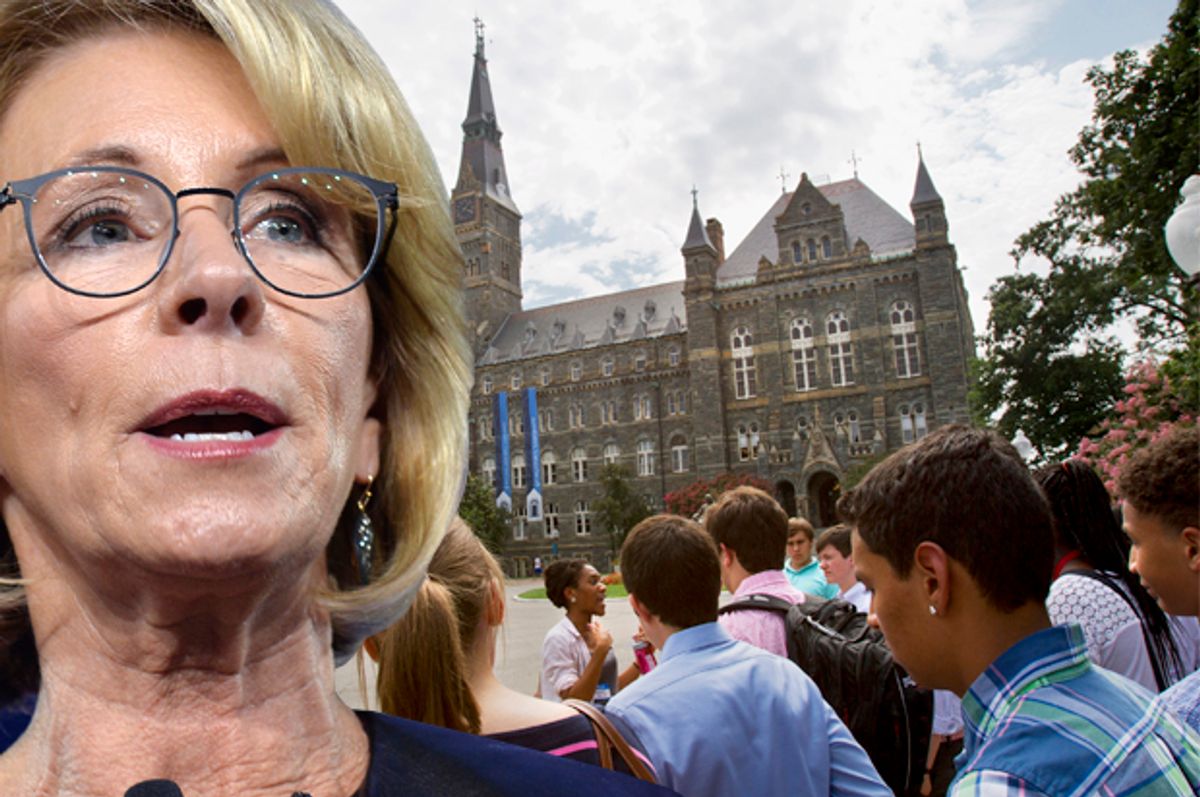Donald Trump's education secretary, Betsy DeVos, just lost a major court battle over consumer protections for Americans who take out student loans.
U.S. District Judge Randolph Moss decided against the request from a group representing for-profit colleges to end regulations that help defrauded students receive federal loan forgiveness and forbid colleges from requiring students to go to arbitration to resolve complaints instead of taking matters to court, according to Politico. As a result of Moss' decision, the consumer protections passed under President Barack Obama will now go into effect, especially because Moss has previously struck down attempts by DeVos to delay the regulations from being implemented.
Moss' ruling is "an important step for borrowers and should be a signal for the department that its deregulatory agenda is both hurting borrowers and is not going to tolerated by the courts," Julie Murray, a staff attorney at Public Citizen, which challenged DeVos' delays in implementing the Obama consumer protections, told Politico. She later added, "The department as of noon today has a legal obligation to implement this rule and, to the extent they don’t abide by that legal obligation, that is something that we and other consumer advocates will be watching closely."
By contrast, Steve Gunderson, president and CEO of Career Education Colleges and Universities, said that he hopes the Trump administration will try to obstruct the implementation of the rules regardless of the court's decision.
"There are many examples of both the Obama administration, and the Bush administration before that, choosing not to implement or enforce rules of the previous administration because they do not agree with such rules. The Trump administration should have the same authority to do so," Gunderson said.
DeVos has been a highly controversial figure since taking office in the Trump administration, for reasons ranging from her support for school vouchers to her uninformed answers during her Senate confirmation hearing. Back in May, she incurred the ire of teachers' unions by giving responses to questions that seemed to blame them for seeking a better standard of living. As Salon wrote at the time:
Although DeVos' school choice agenda was a major topic of discussion — DeVos has long been an advocate of expanding access to charter schools and private schools through voucher programs, which public school officials worry will hurt their districts — the education secretary also expressed unflattering opinions about the teachers in various states who have gone on strike.
DeVos conveyed this view in response to a question about striking teachers by Josh Meibos, Arizona's teacher of the year. After telling Meibos that she could not "comment specifically to the Arizona situation," DeVos added that she wanted to see a situation in which "adults would take their disagreements and solve them not at the expense of kids and their opportunity to go to school and learn," according to audio published by The Huffington Post.
She added, "I’m very hopeful there will be a prompt resolution there. I hope that we can collectively stay focused on doing what’s right for individual students and supporting parents in that decision-making process as well. And there are many parents that want to have a say in how and where their kids pursue their education, too."
Lest there be any doubt as to DeVos' opinion that teachers who were striking were doing so at the expense of the children, she concluded that "I just hope we’re going to be able to take a step back and look at what’s ultimately right for the kids in the long term."

Shares